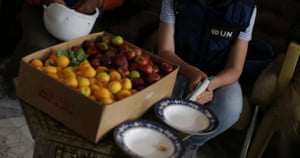Dozens of current and former UN employees described a culture of silence across the organisation and a flawed grievance system that is stacked against victims.
Of the employees interviewed, 15 said they had experienced or reported sexual harassment or assault within the past five years. The alleged offences ranged from verbal harassment to rape.
Seven of the women had formally reported what happened, a route that campaigners say is rarely pursued by victims for fear of losing their job, or in the belief that no action will be taken.
“If you report it, your career is pretty much over, especially if you’re a consultant,” said one consultant, who alleged she was harassed by her supervisor while working for the World Food Programme. “It’s like an unsaid thing.”
The UN conceded that under-reporting is a concern but said the organisation’s secretary general, António Guterres, has “prioritised addressing sexual harassment and upholding the zero tolerance policy”.
Employees working in more than 10 countries spoke to the Guardian on condition of anonymity, partly because they are precluded from talking publicly by UN rules governing staff, partly for fear of retaliation.
Three women who reported sexual harassment or sexual assault, all from different offices, said they had since been forced out of their jobs or threatened with the termination of their contract in the past year. The alleged perpetrators, who include a senior UN official, remain in their posts.

One of the women, who alleges she was raped by a more senior UN staff member while working in a remote location, said: “There are no other options to get justice, and I have lost my job too.”
She said that despite medical evidence and witness testimonies, an internal investigation by the UN found insufficient evidence to support her allegation. Along with her job, she says she has lost her visa and has spent months in hospital due to stress and trauma. She fears she will face persecution if she returns to her home country.
In internal documents seen by the Guardian, two of the women cite concerns with the investigations. They claim that the UN’s investigation’s team, the office of internal oversight services (OIOS), failed to interview key witnesses. They also say that transcripts contain errors and information from inquiries has been leaked.
Alleged perpetrators have been allowed to remain in senior positions – with the power to influence proceedings – throughout investigations.



